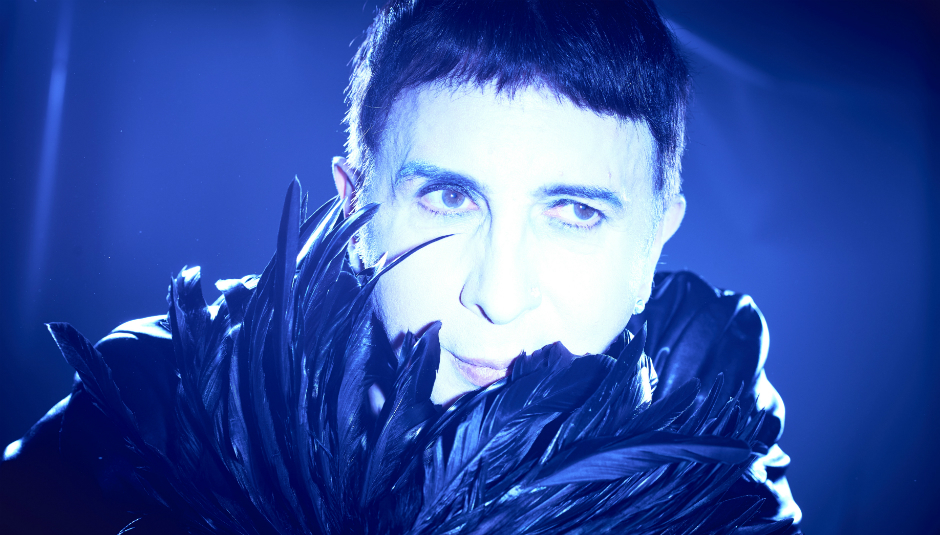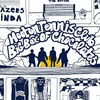LIKE, I expect, many pop kids of my generation, tween and teen years coinciding with the dull-as, drab-as Thatcher years of the early eighties, Marc Almond, in his Soft Cell guise, was probably the first pop star that felt like mine.
Although I was a young, middle-class, straight white 12-year-old when he first came to my attention, watching Marc’s louche moves, the eyeliner, the bangles, the black gear, the knowing looks to camera, his compelling, slightly off in a way that just sounded brilliant voice as he and Soft Cell partner Dave Ball strutted and crooned their way through their cover of old Northern Soul song ‘Tainted Love’ on Top of the Pops opened doors and switched on lightbulbs. Lightbulbs that let me know that music could be more interesting if it wasn’t always nice. That singers and bands were better if they had a shadow of darkness in their backstory, a hint of a messy past and a murky present. That songs sung slightly out of tune, with a world-weary conviction and a massive dollop of drama could trump those nice, plastic, shiny good-looking boys-in-bands that had, up until that point, caught my eye as much as my ears.
His Soft Cell output was consistently inspiring; ballads of seedy affairs, pop bangers about seamy sex and more, and after that band imploded, his output remained enthralling, through Marc and the Mambas, umpteen collaborations (often surprising – from Gene Pitney to Siouxsie Sioux, from Jools Holland to Foetus’ Jim Thirlwell and, erm, Carl Barat), judiciously selected cover versions, and a long solo career until, well, the present day.
A chance to meet Marc was – obviously – not something to be turned down, so I make my way through (well, of COURSE) Soho on that mad, height-of-summer-heatwave day we had back in September to chat, ahead of the release at the end of October of a career-spanning, 10-disc mega box set, perfectly-titled Trials of Eyeliner.
Affable, warm (of temperament, as well as with a slightly ruffled glow from the heat) and as voluble as any interviewer could wish, Marc relaxes in a corner of our swanky private members club with a pot of tea as we exchange initial pleasantries (both oh-so-British) about the weather. Marc, it seems, prefers spring or early autumn to the scorch of the summer sun – “cool refreshing sort of Scandinavian weather”, as he puts it.
Which, I wonder, might be part of the reason he’s so enamoured with Russia?
“I go to Russia a lot, but not as often as I used to. I had a flat there for a little while.”
Currently working on a documentary about Russian tango singer Vadim Kozin, he still nevertheless is there a couple of times a year. So what’s the appeal?
“It’s a fascinating, strange place, full of paradoxes and strange contradictions. I’ve come to love it over the years. It’s got great musicians, great people. The art that comes out of there is great. You know, it’s just got a dodgy government.”
He chuckles, an infectious giggle that recurs several times during our conversation. “But who hasn’t?” Insisting that it’s by no means the worst part of the world for human rights – “There’s a vibrant gay social life in Russia – it’s just not like it is here. It’s not illegal, and nobody gets executed for it, like they do in many other countries” – the discussion moves on to a subject that I have been really keen to talk about with him.
Marc took part in the David Bowie BBC Prom in late July – an event which seems to have dramatically split opinion among those who were there, or saw it on TV or even, I suspect, simply heard about it second hand afterwards and formed their opinion based on social media… I raise the topic by first asking what Bowie meant to him personally.
“The older generation had The Beatles and The Stones, but for my generation, who were teenagers in the early 70s, I think David Bowie was that person. David Bowie taught me more about life than my teachers ever taught me. When I read an interview with David Bowie he talked about films, books, music, and things that you wanted to investigate. So, you know, I went to see ballet because David Bowie talked about it, I went to see theatre, I read books that he talked about, listened to music that he talked about. He was more than just a pop star: a cultural icon.”
And, I tell him, people of MY generation, just a decade or so younger, worked backwards to discover Bowie through the likes of Marc namechecking him in HIS interviews.
“I think as an artist, it’s great to do that, to kind of turn your audience that listens to your music on to things that you like. That’s one thing I got from David Bowie: always mentioning songs that I like and books that I like, and the fans would go: ‘Oh, I read that book you talked about, or saw that film that you talked about and influenced you, and I loved it, and I wouldn’t have thought about looking at it otherwise.’”
So passing the torch, then, in the same way that Bowie did?
“Passing the torch, absolutely.”
Did he ever meet his hero? His reply is a sweet reminder that pop stars that WE idolise can also be starstruck fans themselves.
“No, I… I had a chance to meet him on many occasions, but I never wanted to. Maybe I was a little shy, a little overawed. You know when you meet someone famous and become some gibbering sort of…” He tails off, giggling again.
“You know, say all the wrong things and something totally uncool!” So apart from a near-encounter at an (unspecified, but clearly awful) theatrical event where they both ended up “running for the exit” at the same time, and another time when he got a “nice message” admiring a cover version he’d done of one of Bowie’s songs, he never got any closer to the actual man. Which was, he thinks, the point.
“It’s good, being a music fan, to have this ‘untouchable’ star or musician that you never have to think of as being a mundane earthly being. I’ll always be a fan. People said: ‘Oh, he’s so down to earth, he’s so kind-of human’ and I thought: ‘Well, I don’t want him to be down to earth.’”
And quite right too.
But he seems slightly bruised, if ultimately unbowed, by the mixed reception the Bowie Prom, and his performance in particular, received.
“It’s a weird one, it was kind of a poisoned chalice for a lot of people involved in it. It was a great thing for the BBC to do, to take these David Bowie songs and reconstruct them with great new arrangements. I don’t think anybody totally came out of it alive, totally unscathed!”
So despite experiencing some serious twitter criticism (“They came into my timeline and just replied back with expletives… an outpouring of hate”) he still maintains that “for me it was a great, really special event.”
“Twitter can be a nasty place at times”, he shrugs.
But onto the real purpose of this interview, the all-encompassing new box set, a collection of almost 200 tracks from the length of Marc’s career. It must, I suggest, have been quite a task programming it.
He tells me how he worked on it with Universal, with a co-compiler who was also a fan, to make sure they kept a good balance between Marc’s own preferences and the must-include fan tracks. The set is divided into three sections: History, which he describes as “The history from the beginning, through the albums”, Singles (self-explanatory: “Almost entirely every single I’ve ever done: the hits, the misses, the flops, the bad ones, the good ones, and everything else”) and Gems, which are “rarities, oddities, collaborations.”
The selection process, although gruelling (“I kind of slaved over it for months, over a computer. You know – completely frustrating at times”) does also seem to have been enjoyable, allowing him to rediscover a lot of his own music, much that he hadn’t listened to since completing the relevant album. “It was an amazing thing to do”, he confirms. “I’m so pleased they asked me to do it. It was me curating my own thing, and that was a great opportunity to do that.”
Finding the History section the most challenging (“it was the most difficult part, to get a good journey of the music, how I’ve improved as an artist and a writer”), the Gems section was “quite fun to do” but, as you might expect, it sounds as if collecting together all of the singles was the most enjoyable of all. “I loved that journey – I love those three discs. I discovered that I think I was quite an interesting singles artist.”
Indeed he was (says the girl with every Soft Cell single on vinyl still in pride of place in her record collection).
So has this process given him any insight into himself as an artist? I tell him that what struck me was how – despite the massive differences in musical style and umpteen different other artists that he’s worked with that feature on the compilation – there’s still always something very identifiable about a Marc Almond recording.
“You put yourself in everything you do. Whatever setting you put yourself in, you’ve always got to be there in the centre of it – it’s always got to be recognisable as part of your world” he agrees.
“Whether you’re doing some Russian music, or an electro track, or a pop track, or a rock track, you’ve got to have you at the centre of it. And I think I have this voice – whether you like it or not, and whether it’s a good voice or not – it’s a distinctive voice, and a sound that’s part of that.”
But lyrically as well, there’s a definite mood to his songs. He laughs. “I have a few key words that I want to use, and a language, and it’s recognisable as a Marc Almond thing. People often say: ‘Oh, you’re writing the same thing over again’ and I say: ‘Yes!’”
Once again, Bowie seems to have been the touchstone here. “Going back to David Bowie again, I mean – look at the different styles of music that he’s done. Whether it’s Tin Machine, or whether it’s experimental pop, or glam rock or whatever, he is right there at the centre of it: it’s a David Bowie record, everything else is just a setting. And that’s how I feel. At least everything’s recognisable as me at the centre of it.”
We talk about identity, and how Marc’s public image and private persona differ. He tells me that he’s got a different “official” name now, by deed poll (undisclosed), which he uses when travelling. “I wanted to set myself apart” he explains, continuing “basically, I didn’t want to die with my father’s name on my gravestone.”
But beyond this, it seems to have also been a way of keeping “that part of you to yourself”, while still living up to who his fans want him to be: “I never want to let my fans down.”
He tries to avoid becoming a parody of himself, taking 80s festivals and other backwards-looking events with a pinch of salt (“I can do it with a tongue in cheek, with a playfulness, a self-knowing nod”) but constantly “evolving and changing and going in unexpected directions” in his music, to counter the pull of nostalgia from festival crowds, “not my hardcore fans”, who “come along because they saw you on Top of the Pops when they were young”.
He regrets the way that Soft Cell – having risen to an unexpected fame “too quickly, in a way”, also “imploded so quickly as well”. The pair – “art students, quite belligerent, with our own way of doing things” never seem to have quite managed to reconcile this side with the massive “pop spotlight” they found themselves in – “which was seductive and embracing and nice, but at the same time this other side of us couldn’t stop being the art students, being subversive, belligerent, artists at war with the corporate record company. And it all became too tiring, too exhausting.”
He talks about a Smash Hits cover (which I remember feeling uneasy myself about, at the time) where the pair were “wearing party hats with party poppers”, in an attempt to be ironic “but it just wasn’t coming across as that. We thought – this is AWFUL.” He chuckles again, regretfully. “We thought: ‘We don’t want to be in Smash Hits, we want to be in NME or Melody Maker’, you know?”
So did the more ‘alternative’ press of the time embrace Soft Cell?
“No, they wrote us off at first. I look at someone like Siouxsie and the Banshees, who was making great pop records but at the same time leftfield kind of rock or post-punk or whatever, and The Cure, who were making great pop singles – ‘Love Cats’ etcetera – but at the same time were making interesting albums, getting the best of both worlds. We wanted that, once it happened – that’s what we wanted to do. Still make a great pop single, but darker.”
If he has any regret in his career, apart from missing out big-time on royalties with ‘Tainted Love’ (“I should have put one of my own songs on the b-side… and then I made the SAME mistake on ‘Something’s Got A Hold of My Heart’ – what was I thinking?”), it’s in the manner of how Soft Cell ended. “Once we finished, in ’83, ’84, I’d have probably said: ‘Stand back a little bit. Go and do something else, something solo, re-evaluate things a bit, take a breather. Because it’s all been too exhausting.’ Maybe just stand back, not be so final.”
Ultimately “Soft Cell, to me, was always a case of unfinished business and flaws”, the same applying to the band’s early 00s reunion, which Marc feels was a “squandered opportunity” admitting, of comeback album Cruelty Without Beauty, “there was a great album in there, but it was flawed – we gave away the best tracks to put on a Best of Soft Cell album, replacing them with filler tracks.”
Nowadays, keeping up with live music (“Trouble is I can’t do the standing up – I have to go to the sitting ones. There was a time I’d have been down in the moshpit…”) and currently enjoying artists like Christine and the Queens, Wild Beasts, and Cat’s Eyes, does he feel that a band like Soft Cell would still have made their mark in today’s slicker pop world?
“I think there’s less of that kind of maverick oddities, that oddball quirky pop, although it is still there.”
But Marc’s very much moving forward rather than looking back, now that he’s completed the box set. He seems keen to stress that it’s not “a tying-off the end of your career, like getting a lifetime achievement award: ‘You’re over, bye!’” Rather, it has been “a good stocktaking, a good moment at my age, at this time in my career – an Indian summer, as it was.”
But now, he’s just signed “my first major record deal since 1996, a big two album deal” with BMG, “and that, for me, at my time of life and in my career, is a fantastic thing”.
He’s currently planning the new albums out, and writing, but isn’t at a stage yet where he can tell me anything more. It’s more evidence, though, that this vibrant and creative soul is not letting up, not waving his audience goodbye any time soon. And as we say our goodbyes, Marc off home to let his birds (a mynah bird and a parrot) out into the sunshine, me to struggle into the steamy Soho afternoon, that’s a brilliant thing to know. Marc Almond still has a lot more to say.
The 10 CD box set Trial Of Eyeliner: Anthology 1979-2016 is out on Universal Music on 28 October. For more information, including upcoming live dates, visit his official website.






















